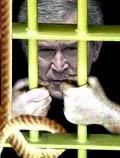| Find |
Wednesday, 5 March 2008
Am I a Torturer?
The prisons in Iraq stink. Ask any guard or interrogator and they'll tell you it's a smell they'll never forget: sweat, fear, and rot. On the base where Ben Allbright served from May to September 2003, a small outfit named Tiger in western Iraq, water was especially scarce; Ben would rig a hose to a water bottle in a feeble attempt to shower. He and the other Army reservists tried mopping the floors, but the cheap solvents only added a chemical note to the stench. During the day, when the temperature was in the triple digits, the smell fermented.
It got even hotter in the Conex container, the kind you see on top of 18-wheelers, where Ben kept his prisoners. Not uncommonly the thermometer inside read 135, even 145 degrees. The Conex box was the first stop for all prisoners brought to the base, most of them Iraqis swept up during mass raids. Ben kept them blindfolded, their hands bound behind their backs with plastic zip ties, without food or sleep, for up to 48 hours at a time. He made them stand in awkward positions, so that they could not rest their heads against the wall. Sometimes he blared loud music, such as Ozzy or AC/DC, blew air horns, banged on the container, or shouted. "Whatever it took to make sure they'd stay awake," he explains.
Ben was not a "bad apple," and he didn't make up these treatments. He was following standard operating procedure as ordered by military-intelligence officers. The MI guys didn't make up the techniques either; they have a long international history as effective torture methods. Though generally referred to by circumlocutions such as "harsh techniques," "softening up," and "enhanced interrogation," they have been medically shown to have the same effects as other forms of torture. Forced standing, for example, causes ankles to swell to twice their size within 24 hours, making walking excruciating and potentially causing kidney failure.
Ben says he never saw anything like that. The detainees didn't faint or go insane, as people have been known to do under similar conditions, but they also "weren't exactly lucid." And, he notes, "I was hardly getting any sleep myself."
When I first set off to interview the rank-and-file guards and interrogators tasked with implementing the administration's torture guidelines, I thought they'd never talk openly. They would be embarrassed, wracked by guilt, living in silent shame in communities that would ostracize them if they knew of their histories. What I found instead were young men hiding their regrets from neighbors who wanted to celebrate them as war heroes. They seemed relieved to talk with me about things no one else wanted to hear—not just about the acts themselves, but also about the guilt, pain, and anger they felt along with pride and righteousness about their service. They struggled with these things, wanted to make sense of them—even as the nation seemed determined to dismiss the whole matter and move on.
This, perhaps, is the real scandal of Abu Ghraib: More
Posted at
13:22
![]()
Post Title: Am I a Torturer?
![[Zionazis-1.jpg]](https://blogger.googleusercontent.com/img/b/R29vZ2xl/AVvXsEg_x8DOGucgHQmfJJujuK_oYJdxhEnskhQqt-Og7lSk52HeaDQYzW8NQWfdpHmPgj_FJN0jJ3tz1prR1jVZHdHky2HDQxxcs4LVxX0DtAt3fG0sfRr6MDx7Sz8cJNjl0k0RS9TbCjangQ/s1600/Zionazis-1.jpg)




